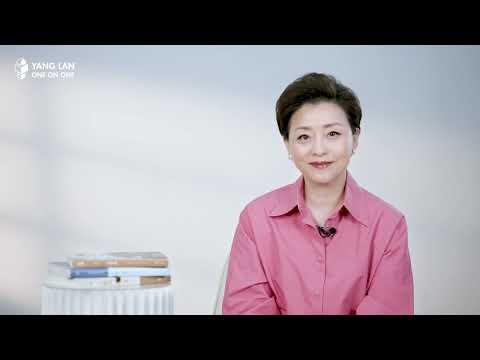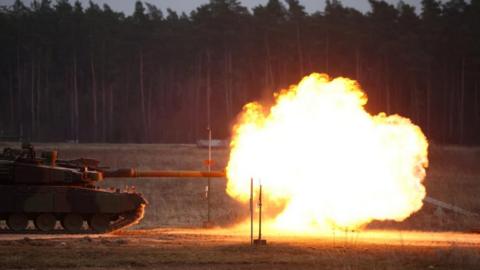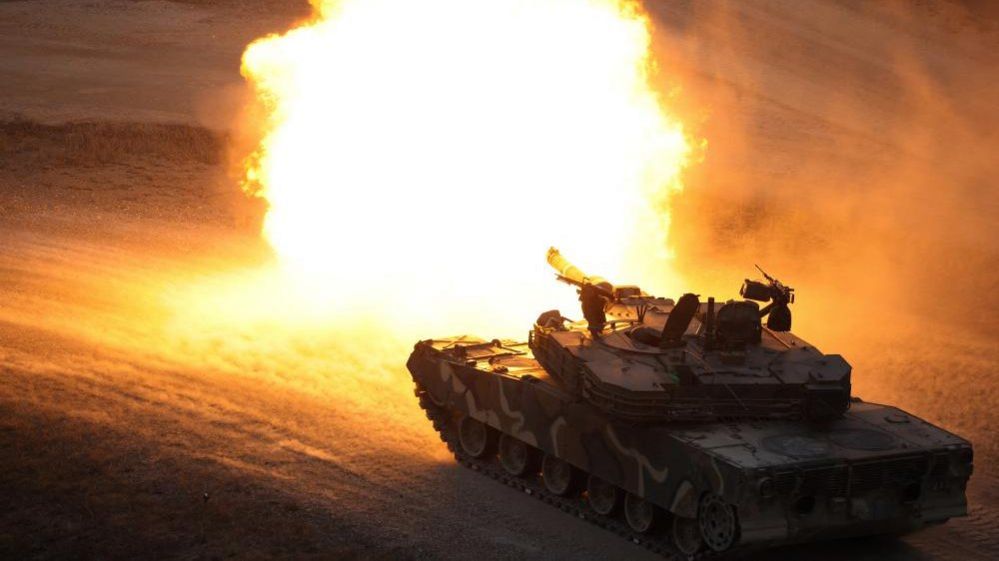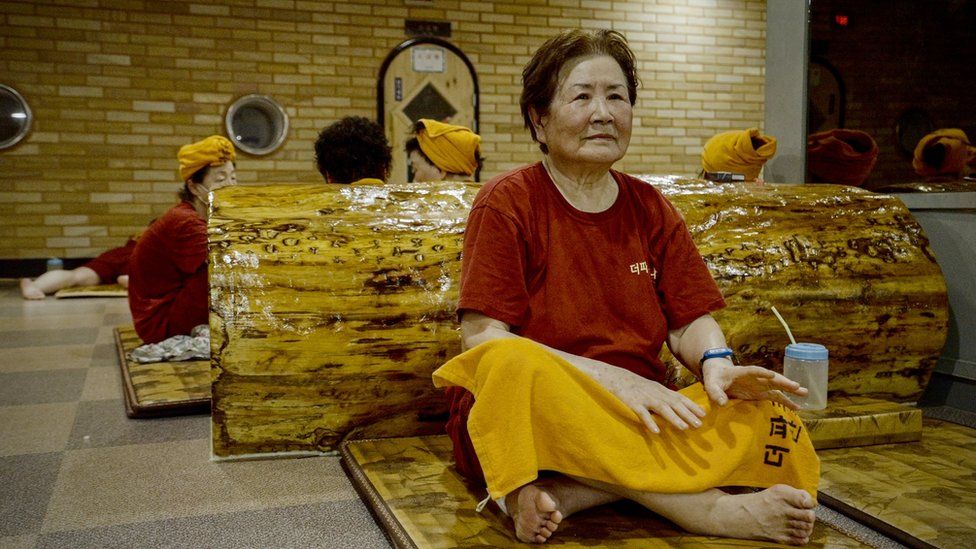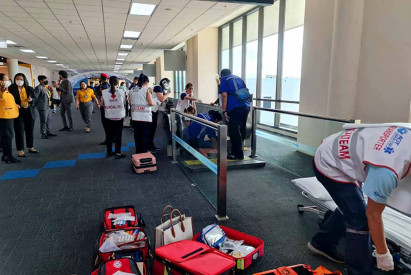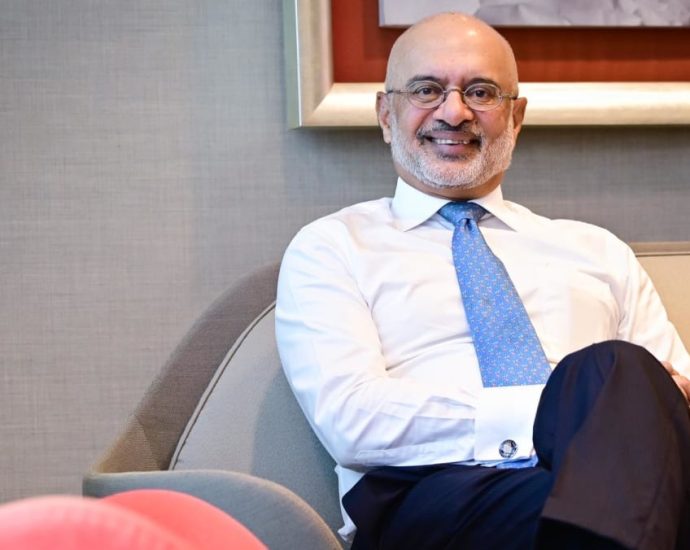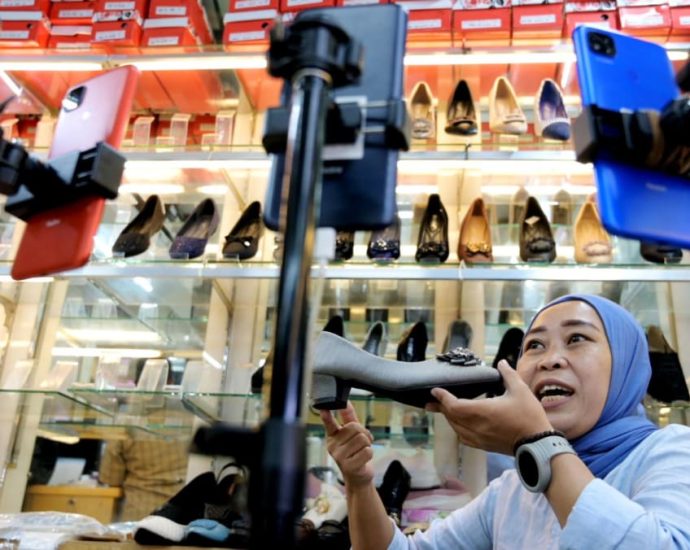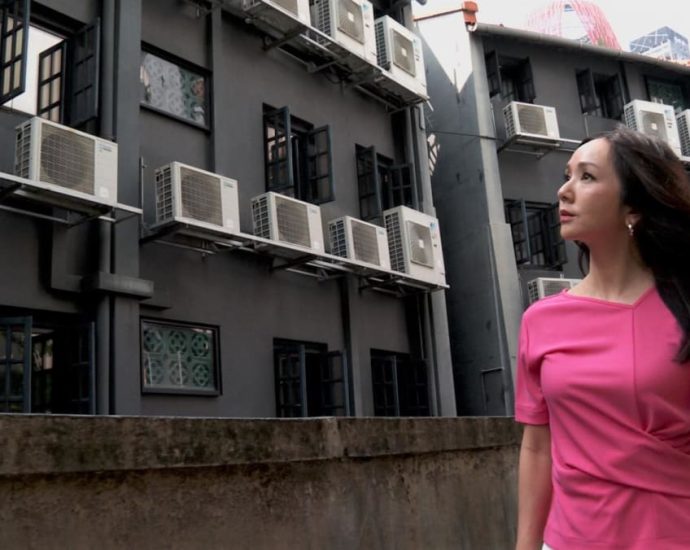Yang Lan interviews Xie Zhenhua â One on One

[embedded content]
Chinese climate advisor Xie Zhenhua has been the lead negotiator for China at most United Nations climate change conferences since 2009. He led the Chinese delegation at the COP26 in November 2021. In an interview, Xie shares his view about why China is willing to take climate action and how the country will achieve its carbon neutrality goal.
Yang Lan, one of China’s top TV journalists and entrepreneurs, partners with Asia Times to showcase the ground-breaking series, “Yang Lan One on One.” Yang reveals the victories, wisdom and breakthroughs of the many global luminaries she’s interviewed. Learn how these trailblazers – from movie stars, scientists and economists, to entrepreneurs and government leaders – have ignited social progress throughout the world.
Asia Times is the distributor of the series.
Episode 1: Yang Lan interviews Michelle Yeoh – One on One
Episode 2: Yang Lan interviews Donnie Yen – One on One
Ukraine war: Pressure builds on South Korea to send arms to Kyiv
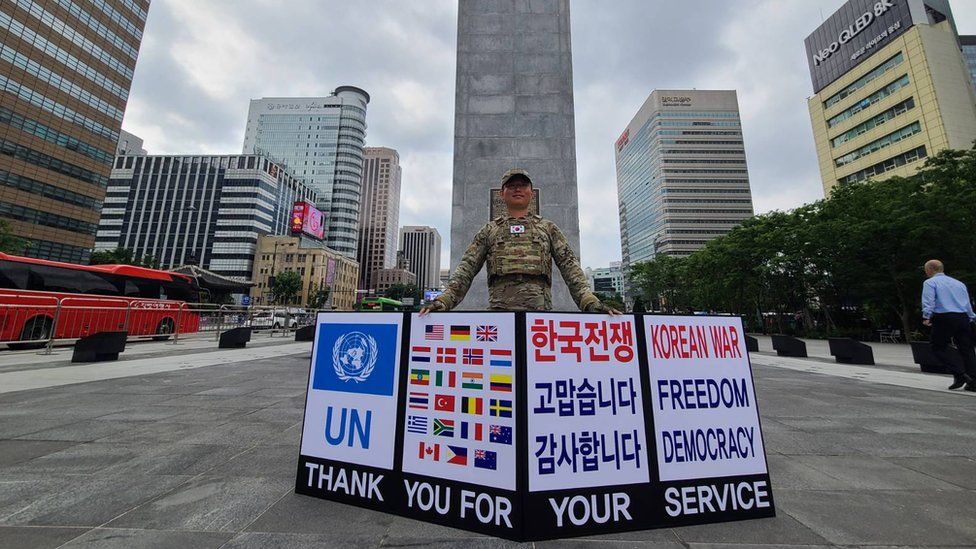
Sgt Kim Jae-kyung stands, unflinching, outside the Colombian embassy in Seoul, dressed in full military gear. The day before, he was in front of the Dutch embassy. The day before that, it was the Greek.
This one-man demonstration by the former special forces soldier is his way of showing gratitude to all 22 countries who sent troops or medics to support South Korea after it was invaded by its neighbour North Korea in 1950. Now he wants his country to help Ukraine, following its invasion by Russia in February 2022.
“We are lucky enough to now be the 10th most prosperous country in the world, because of the foreign soldiers who shed their blood and sweat for our country,” the 33-year-old says.
It is this rationale which led him to the battlefield in Ukraine, where he served on the front line for four months alongside the Ukrainian army, as an anti-drone gunner and combat medic for the 3rd Battalion of the International Legion.
Kim is one of just a handful of Koreans known to have defied his government’s orders, by heading to Ukraine to fight. As he entered the north-eastern city of Kharkiv, shortly after it was reclaimed from the Russians, he witnessed first-hand what he describes as “horrendous, evil, war crimes”.
This is why – in his mind – South Korea must now do more to help the Ukrainian war effort.
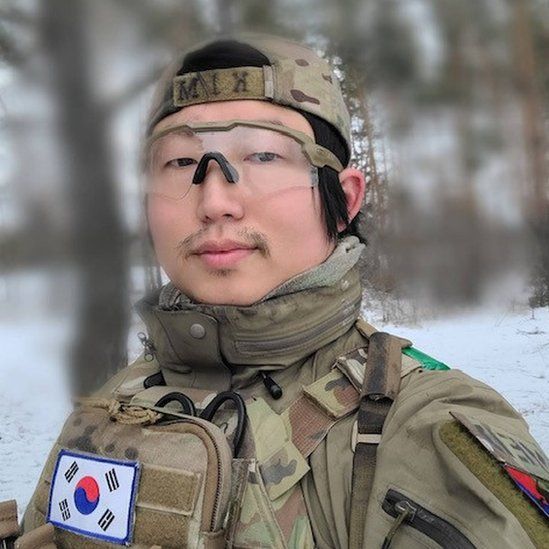

Weeks into its counter-offensive, Ukraine is burning through ammunition faster than its allies can produce it.
Meanwhile South Korea is cautiously sitting on one of the biggest stockpiles in the world. With its own conflict with the North still unresolved, it doesn’t know when it might need the bullets.
Not only this, but with its flourishing defence industry, it is turning out tanks and other weapons at a speed that countries in Europe can only dream of.
Ever since the start of the Ukraine war, pressure has been building on Seoul to send its arms to Kyiv, from the US, UK and EU member states. They have invited the South Korean President Yoon Suk Yeol to next week’s Nato summit in Vilnius.
Ukraine’s Ambassador to South Korea, Dmytro Ponomarenko, told me ahead of the summit that he believed South Korea’s weapons could “change the course of the war”.
Ukraine’s President Volodymyr Zelensky recently made a similar plea in the Korean press.
“Please remember that 70 years ago, Korea was in desperate need of help. The whole world reached out to Korea in defence of justice and freedom. Ukraine today is like Korea 70 years ago,” the leader said.
But, despite signing up to all international sanctions on Russia, and providing Ukraine with more than $200m of humanitarian aid, the government has drawn the line at sending lethal weapons.
Publicly politicians have been able to hide behind a long-standing policy of not arming countries in conflict, but privately many worry about antagonising Russia. Before the war, in 2021, the two countries conducted $27bn worth of annual trade. Seoul also hopes, somewhat wishfully, that Russia might be able to keep North Korea in check.
“The Russians have made it very clear to us that weapons are their red line, and that if we cross it, they will retaliate,” a South Korean diplomat told me recently.
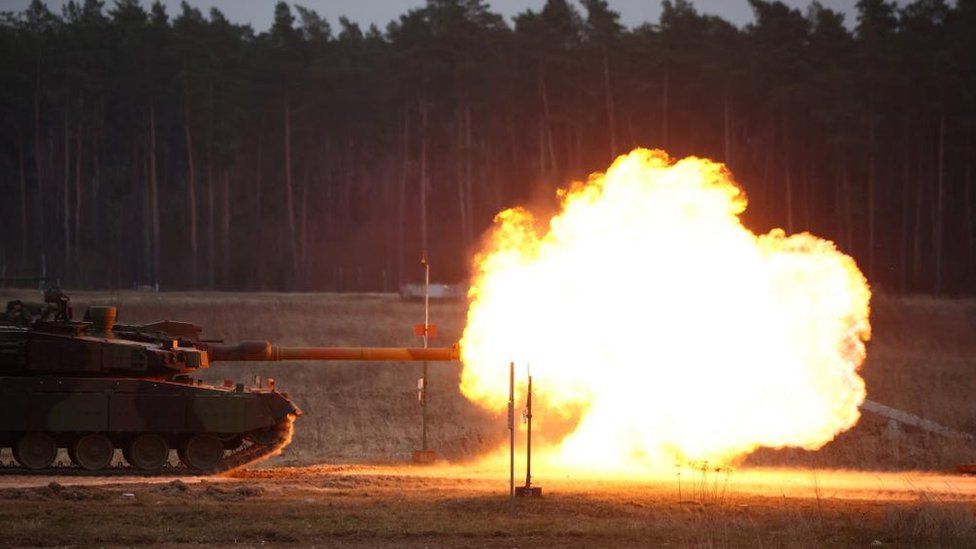
This retaliation may come in the form of economic sanctions, or, more concerningly for Seoul, support for North Korea’s leader, Kim Jong Un. The Russian politician and former president Dmitry Medvedev hinted in April that Moscow could supply Pyongyang with the latest technology for its nuclear weapons if Seoul were to support Ukraine militarily.
Instead, South Korea has taken the more comfortable approach of selling weapons to those who are already arming Ukraine, to help replenish their depleted stocks. Last year it sold $13.7bn worth of tanks, jets and other arms to Poland, followed this year by a huge haul of ammunition – more than 4 million rounds.
And after agonising over whether to provide the US with hundreds of thousands of Nato-standard 155mm shells, a private sale of the artillery has now been agreed. There is little to stop Poland and the US sending these weapons on to Ukraine. Indeed, there are reports (in Korean) that some of the ammunition is in the process of being transferred.
Ramon Pacheco Pardo, the Korea Chair at the Brussels School of Governance, believes Seoul is aware its shells are being redirected.
“It is difficult for the South Korean government to argue that the country’s lethal weapons are being used in Ukraine without its knowledge,” he said. Though the South Korean government is refusing to be drawn on the deals, citing “national security concerns”, and says its policy on weapons supply has not changed.
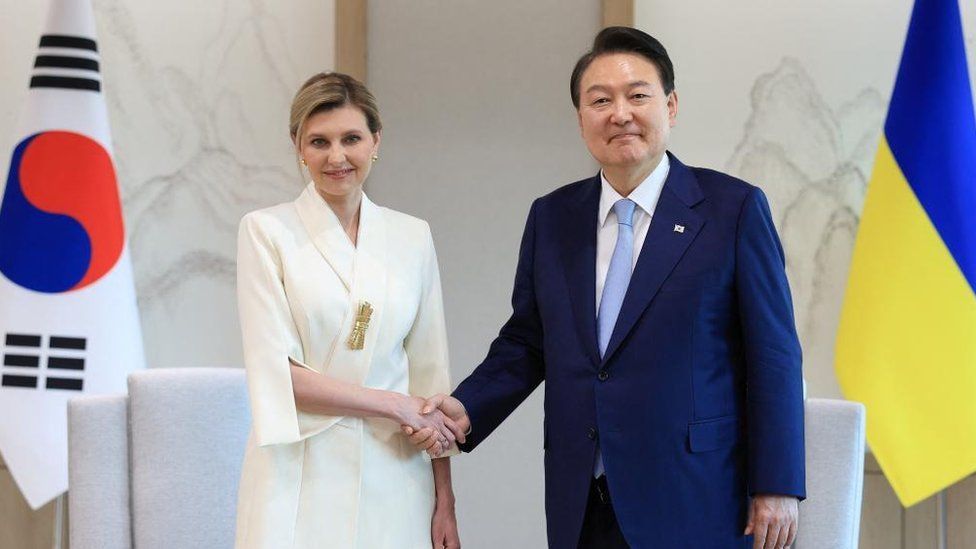
But when Ukraine’s First Lady Olena Zelenska visited Seoul in May, followed by EU chiefs Ursula von der Leyen and Charles Michel, lethal weapons were mysteriously absent from their list of requests. The feeling among Western diplomats in Seoul is this indirect supply is working well enough, for now.
But Ambassador Ponomarenko is urging the government to do more by sending weapons to Ukraine directly. “We understand this is not easy, so as a first step we are asking South Korea to supply us with defensive rather than offensive weapons, like anti-missile and anti-drone systems,” he said.
Some question the difference South Korean weapons would make to the war.
“South Korea’s strength is in the post-war recovery phase rather than military support,” said Prof Kim Youngjun from Korea National Defence University, who advises the government. “Korea’s experience and expertise in building roads, hospitals, schools, telecommunications, will be more useful,” he said.
Ambassador Ponomarenko disagrees. “We know that South Korea would like to participate in the reconstruction of Ukraine, but to start the renovation, we must end the war. And to end the war, we need its lethal weapons,” he said.
Kwon Ki-chang, who served as South Korea’s ambassador in Ukraine until 2021, thinks his country should agree to Kyiv’s request.
He believes South Korea is facing a critical choice, about what it wants to stand for – whether it continues to define its national interest based on economic interests, or whether it wants to champion democracy and freedom.
“We must escape our small country mentality and not be afraid to stand up to Russia, to defend democracy and freedom. We may suffer some short-term economic losses, but we can overcome them. This is the right thing to do.”
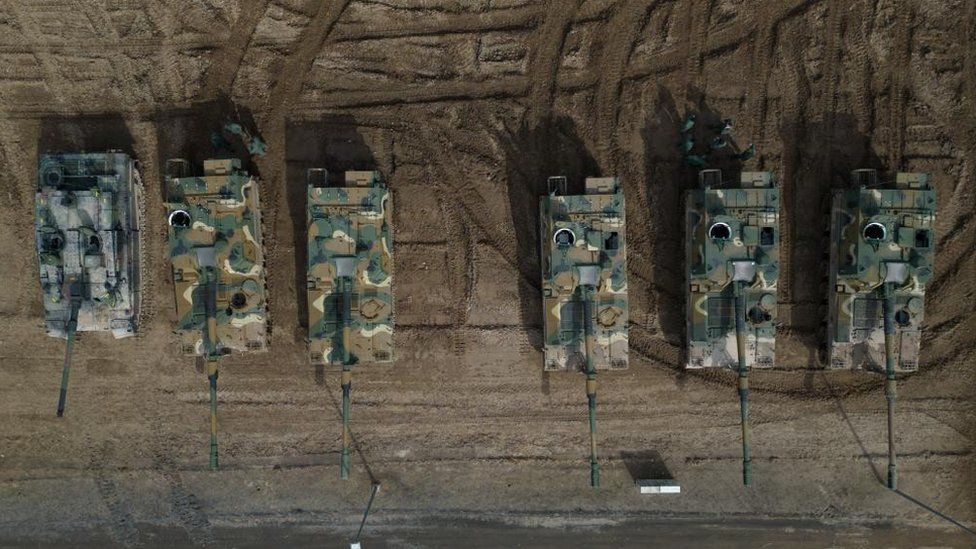
With Moscow surely aware of Seoul’s strategy of indirect supply, one South Korean official suggested it to me, it was not the Russians the government is worried about any more.
A recent poll suggested that 56% of South Koreans oppose such assistance, with 42% in support. With elections next year, the government does not want to give the opposition any metaphorical ammunition.
Though events in Ukraine may force its hand.
Softening his stance, the South Korean president suggested in April that if Ukraine were to come under a large-scale civilian attack, he would consider sending arms. It is said he also sees similarities between the Korean and Ukraine wars.
When the war in Ukraine broke out, some South Korean politicians viewed it as a faraway war. Now they argue it has come too close to home. Few doubt that what happens in Ukraine will change the world, with the impact felt here.
What the South Korean president must decide, as he heads to the Nato summit, is does he want to try to influence the outcome or merely deal with the consequences.
The atrocities witnessed by former soldier Kim Jae-kyung have left him struggling with PTSD, he says, and prone to bursts of anger. He is waiting to find out whether he will be fined for breaking the law, to take part in the war, while his passport has been frozen.
“We must do what we can to end this as soon as possible, and prevent further war crimes,” he says.
Related Topics
‘Lost screws’ to blame for airport leg mangling

Missing screws under a platform of the moving walkway were the cause of the incident at Don Mueang Airport that cost a woman a part of her left leg on June 29, an observer in the fact-finding probe said on Friday.
Assoc Prof Weerachai Phut-dhawong, a lecturer of the Chemistry Department at Kasetsart University’s Faculty of Liberal Arts and Science, said it really was an accident.
Assoc Prof Weerachai was appointed by the victim’s family to join the fact-finding committee, which also comprises the Ministry of Transport, the Engineering Institute of Thailand (EIT), the Engineers Council and the Siam Hitachi Company.
The incident occurred last Thursday around 8.40am in the South Corridor of the domestic terminal at the airport. The injured woman is being treated in an ICU room at Bumrungrad International Hospital.
Speaking after the committee meeting on Friday, Assoc Prof Wee-rachai said the mechanical failure might have been caused by missing screws under the platform.
He said normally, each panel of the moving walkway has been tightened with four screws, but the panel that the woman stepped on had only one screw. Three screws were missing, so when she stepped on the panel, it fell while the walkway was still moving and trapped her leg.
“I view this as an accident, and it has nothing to do with luggage or the missing comb of the travellator. The travellator had been used for almost 30 years, and the sensor system was functional as it stopped the walkway in 10 seconds,” he said.
However, the 10 seconds seemed to be too long as it appears to have cost the woman her leg, he said.
He said everyone on the scene, including four flight attendants and technicians rushed to help the victim at that time.
The question is how those screws went missing, he said, surmising it might be because the moving walkway was too old.
Meanwhile, Kit Kittirattana, the victim’s son, thanked Assoc Prof Weerachai in a Facebook post for proving his mother was not at fault by looking at whether the incident was caused by carelessness on her part or the fault of a certain agency.
“I urge the fact-finding committee to inspect the matter thoroughly to prevent the recurrence of such an incident,” he said.
Mr Kit also said Assoc Prof Wee-rachai proposed the committee re-enact the incident and it will hold at least two more meetings, adding that Airports of Thailand is preparing to issue a statement admitting fault and taking full responsibility for the accident.
“My mother is recovering after being treated in an ICU room for four days,” he added.
MFP predicts PM nod for Pita
Sec-gen says Senate will back their leader

The Move Forward Party (MFP) has expressed confidence its leader Pita Limjaroenrat will receive enough support from senators to become the new prime minister in the crucial vote next Thursday.
MFP secretary-general Chaithawat Tulathon on Friday brushed aside remarks by some senators that they would not vote for Mr Pita as they are concerned about his party’s policies, especially the planned amendment of the lese majeste law.
Some senators who had previously pledged to vote for him have apparently had a change of heart due to the party’s stance on changing Section 112 of the Criminal Code, or the lese majeste law. The MFP has vowed to press for an amendment.
In response, Mr Chaithawat on Friday said: “These are only the opinions of some senators, but most of the senators have not yet expressed their view on the matter.”
He also expressed confidence that the talks between the MFP and senators will deliver a positive outcome, as most senators would want to give the country an opportunity to move forward.
The 250 appointed senators are allowed by the constitution to participate in the vote, along with the 500 elected members of the House of Representatives.
Under the constitution, a PM candidate would need the support of at least half of the 750 members of both the lower and upper chambers of parliament, or 376 votes in total.
The eight coalition parties are said to have secured 312 votes in support of Mr Pita and now need 64 more votes from senators or other MPs to reach that threshold.
Asked if the MFP would back down from its bid to amend Section 112, Mr Chaithawat said that the party could allay the senators’ concerns.
He also said he would ask House Speaker Wan Muhamad Noor Matha if it would be possible for a PM candidate to outline his vision before the vote in parliament and whether members of parliament should also be allowed to quiz the candidate before making their decision.
Asked to comment on what would happen if Mr Pita fails to win in the first round of voting on July 13, Mr Chaithawat said that in that case, the MFP would nominate him again for another vote on July 19.
House Speaker Wan previously said that if Mr Pita fails to secure the votes required to become Thailand’s next prime minister in the House session set for next Thursday, then a second round of voting is likely to be held on July 19.

We may celebrate (Mr Pita’s election as PM) on the evening of July 13 – Chaithawat Tulathon, MFP secretary-general.
However, Mr Chaithawat said he believed Mr Pita would win in the first round and emerge as the new prime minister.
“We may celebrate [Mr Pita’s election as a new PM] on the evening of July 13,” Mr Chaithawat said.
“But if the voting for a new premier drags on for several rounds, then the formation of a new government would also be delayed.
“This may also affect deliberations on the 2024 fiscal budget as well as the economy. Investors will have to suspend investment as they have to assess the situation.
“The faster everything is completed, the better, so Thai politics will stabilise,” Mr Chaithawat said.
Asked if the MFP would support a PM candidate from Pheu Thai if Mr Pita fails, Mr Chaithawat insisted that Mr Pita is the only PM candidate nominated by the eight coalition parties.
The MFP’s deputy leader, Sirikanya Tansakun, on Friday claimed that the party had won over enough senators to back Mr Pita’s bid to become prime minister.
“But we must also have a contingency plan in case some senators may have a change of heart. No one knows what will happen on the day of voting,” she said.
Deputy Pheu Thai leader Phumtham Wechayachai said on Firday that the eight coalition parties would stick together and support Mr Pita to become the next prime minister.
Meanwhile, Senator Prapasri Suchantabutr insisted on Friday that she would vote for Mr Pita to be the next prime minister because his party had received the most votes in the May 14 election.
Work It podcast: DBS CEO on blame culture and âair coverâ when things go wrong
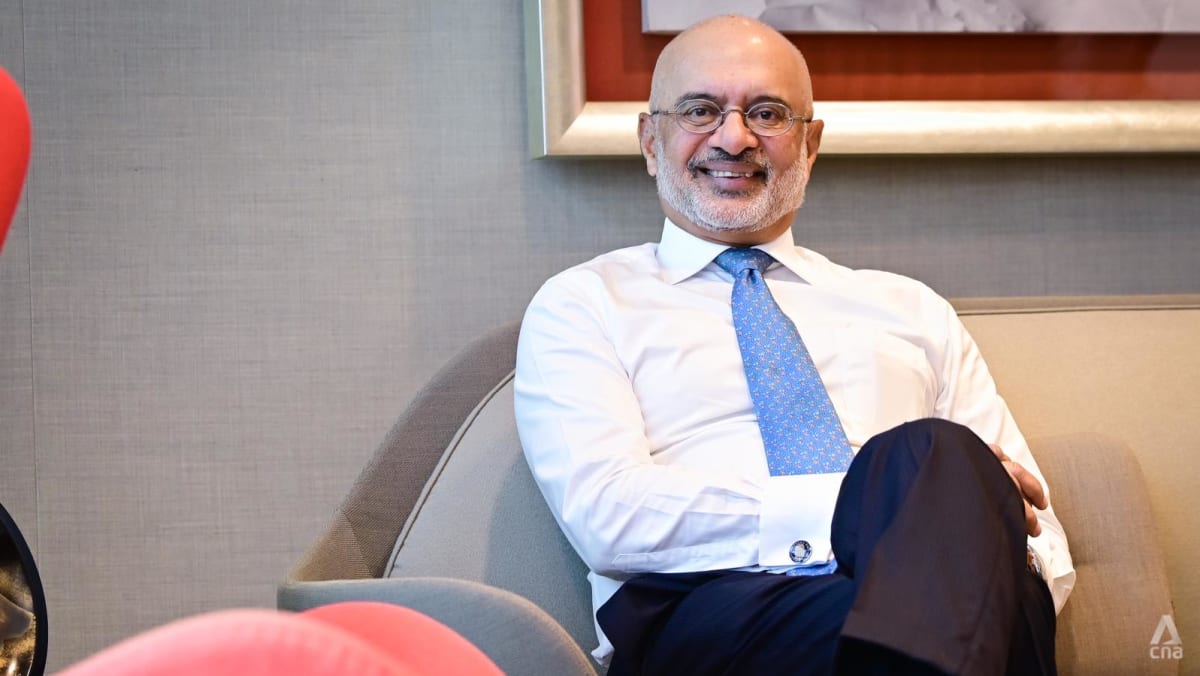
The second big part is this: Received wisdom then and even now has always been that it’s very hard for old companies to change, it’s very hard for old people to change. And it’s something that I’ve never believed … look (at) those in their 40s and 50s and 60s. We’re all changing in our personal lives.
When people have changed in their personal lives, why do we think they can’t change in a company? I have this big belief that the problem is not with human beings; the problem is with the company.”
ON HOW FAILURE CHANGED HIM
Gupta: When you’ve seen the bottom of the barrel, which is what I thought I was seeing (when his own business went bust during the dotcom crash), it changes your outlook. It changed my appetite for risk. At the end of the day, the change is so rapid and change is accelerating … without making some bets, without taking some moonshots, or taking some risks, you’re not going to succeed.
In my 20s and 30s, building a career was probably my single biggest driver. How do I make sure that I can get ahead, I get promoted, I get a bigger job, I become the youngest managing director?
Commentary: Are mothers burning out because they bring their ‘A’ game to both parenting and work?

But look more closely and see how the gap changes. Between the ages of 25 to 29, women participated just slightly more than men in the same age group, at 91.1 per cent compared with 87.5 per cent respectively.
Here’s the rub: This number dips for women in their 30s (90 per cent), but increases for men (97.6 per cent). By their late 40s, 82.7 per cent of women work compared with 96.1 per cent of their male counterparts.
This is something Ms Koh hears all the time, she told me in CNA’s Work It podcast limited series, The Leader’s Chair.
“There are a lot of examples of women who had to, in a way, ‘sacrifice’ their career development because of family. There have been too many stories I’ve heard, too many friends I know who had to give up their career,’’ she said.
And when the two meet at an inflection point, women choose to pick up the caregiving. She put it down to expectations women have of themselves, a way of thinking that is so entrenched they sometimes don’t even realise it.
This is why mothers are the first ones teachers call when their kids are sick or in trouble, said Ms Koh. They are the ones who run to the doctor or wake up early to make sandwiches.
The boy who was caged and scalded to death | Interactive
This is the horrific story of sustained abuse that led to a 5-year-old boy’s death at the hands of his parents, from repeatedly pouring hot water on him, to keeping him in a cat cage. Continue Reading
Indonesia’s social commerce boom comes with an unexpected casualty – struggling shopping malls
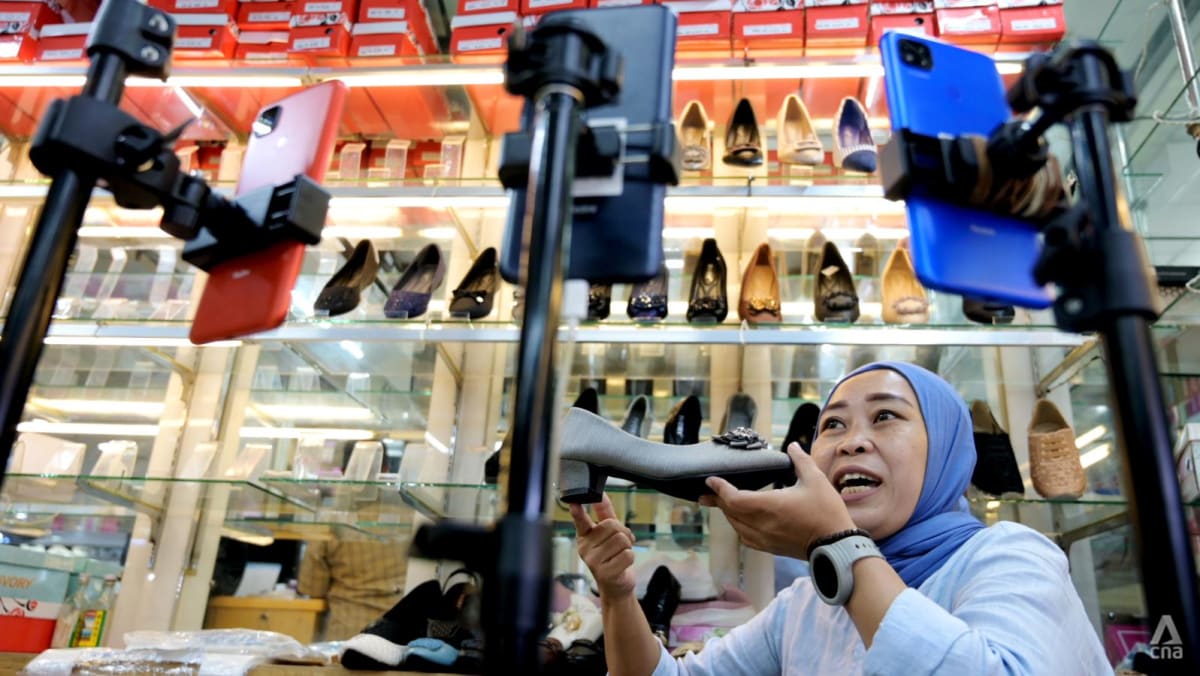
Shopkeeper Hariyanti said she and her colleagues go live for two hours everyday between 12pm and 2pm, displaying one item after another using three smartphones to capture audiences from three different platforms: TikTok Shop, Shopee and Instagram.
So far, she said, the store generates more sales from TikTok Shop compared to the other two platforms.
“Maybe (TikTok Shop) is more suited to our demographics. Maybe because (TikTok Shop) has more promos like discounts and free delivery. I don’t know for sure,” she said.
SOME SHOPPING MALLS STRUGGLE TO RECOVER
Miranti Amelia, who owns a clothing shop at a mall in West Jakarta, said although her store still welcomes physical customers from time to time, their numbers are dwindling.
“They usually saw us on social media but insisted on coming to the store to try our clothes for themselves. They buy one or two clothes and once they are confident with our products, their next purchase will be done online,” she told CNA.
“I even had one customer who came to the shop, tried our products and bought the same items at our online store while she was still at my physical shop. When I asked her why, she said: ‘There are many promos online’.”
Amelia said with offline sales dwindling, her physical store now acts more like window dressing to her online store and a backdrop for her daily livestreams.
“I plan on moving everything to a two-storey store. It’s hard to operate an online store from inside a mall. There’s not enough space for my workers to pack our shipment. Our couriers have to go up and down the stairs and elevators,” she said.
But moving away from a shopping mall is not for everyone.
Shop owner Josh Sulistyo said although his store’s online sales are starting to catch up with its offline transactions, he will continue to operate from Tanah Abang shopping complex, which has a reputation for being a magnet for wholesalers from across Indonesia.
“We need this shop to show (wholesalers) that we mean business, give them extra confidence that we have ample stock and we can deliver no matter the size of their order,” he said.
What impact can 3 degrees have? The right air-con setting may boost productivity, and more

That was not the only result. “It was really interesting, physiologically,” said experimenter and SUSS associate professor Emily Ortega. “With skin temperature, it was quite clear that it kept going down in the slightly warmer condition.”
The convergence of lower skin temperatures and faster reaction times points to 25 deg C as more conducive to working, even though many of the participants, before the experiment, thought the colder the room, the higher their productivity.
“Now we have some kind of evidence to suggest that what you think isn’t what you get,” said experimenter Ooi Seok Hui.
The National Environment Agency advises setting the air-con at 25 deg C as an energy-saving tip. And there is also research behind this.
Air-conditioning and Refrigeration Association president Leong Cheng Wee, citing the famed thermal engineer Povl Ole Fanger, said comfortable temperatures can range between 22 and 27 deg C.
WATCH: What is the best temperature to set my air conditioner? (22:25)
Commentary: Why is hard-selling prepaid packages so common across Singapore beauty salons?

SINGAPORE: The beauty service industry in Singapore unfortunately has a poor reputation because of a few bad actors. The latest of these is beauty salon chain Salon One, which was accused of engaging in pressure sales tactics at some of its outlets. The salon also received a warning for making false health claims over its treatment.
Singapore’s consumer watchdog, the Consumers Association of Singapore (CASE), received more than 1,400 complaints against the beauty industry in 2022, accounting for about 10 per cent of all the complaints it received.
Prepaid packages often feature in pressure sales tactics across beauty service providers. You’ve probably heard the horror stories or even experienced them yourself: A salesperson places the customer in a closed room and points out all their physical flaws, then offers a limited-time special promotion for treatments to address them.
A friend who went through this described the experience as unpleasant and suffocating. She felt trapped in the room until she agreed to buy more sessions. She ultimately gave in and purchased the smallest package.
Despite finding the treatment satisfactory, she never returned because the experience left a negative impression, and did not want to go through it again when her package ended. She would rather waste the money that she had spent.
The beauty salon lost a potential long-term customer and gained a negative reputation among my friend’s social circle. So why are hard-selling prepaid packages still a common practice in the industry?
PREPAID PACKAGES PROTECT SALONS
From a business perspective, prepaid packages protect the salons that sell them. Running a beauty salon requires significant capital, including rental, staffing, as well as purchase and maintenance of equipment.

